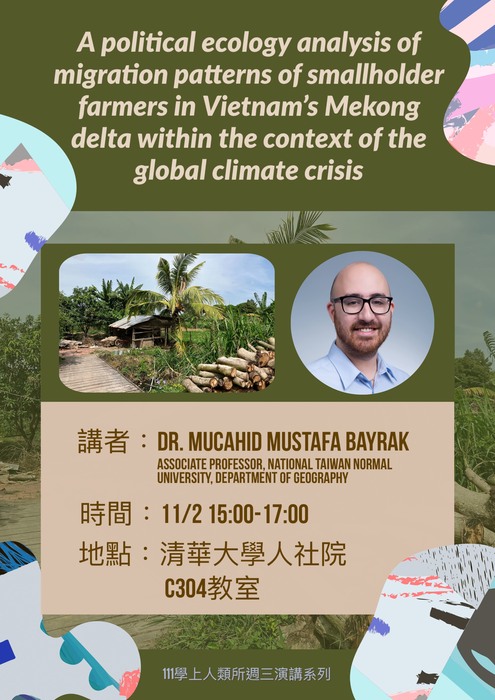2022.11.02 A political ecology analysis of migration patterns of smallholder farmers in Vietnam’s Mekong delta within the context of the global climate crisis

講者:Dr. Mucahid Mustafa Bayrak(Associate Professor, National Taiwan Normal University, Department of Geography)
時間:2022/11/02(三)15:00-17:00,
地點:清華大學人社院C304教室
主辦單位:清華大學人類學研究所
報名表單:
https://docs.google.com/forms/
線上參與連結:https://meet.google.
簡介:
Current academic and popular media discourses often portray the global climate crisis as a main trigger of why smallholder farmers migrate to urban areas. This has especially been true for Vietnam’s Mekong delta, the so-called ‘rice-basket’ of Vietnam and the rest of the world. As out-migration flows in the Mekong delta are consistently positive in the past decades, this trend has often been (solely) attributed to climate change. In this paper I argue why this is not necessarily the case. Based on household surveys, expert interviews and in-depth interviews with local households, I analyze why local farmers and/or their household members in Vietnam’s An Giang province migrate to urban areas and elsewhere (such as Taiwan). While most farmers faced problems related to climate change, such as unpredictable weather events and drought, migration patterns were often linked to economic reasons, such as increasing costs of fertilizer, lower profit margins, lack of ability to upscale agricultural practices to ‘higher’ and more profitable forms (e.g. aquaculture), and the establishment of new industrial zones. Additionally, environmental change in the delta should not only be linked to climate change, but also to upstream hydropower development, sand mining and riverbank erosion, government policies and infrastructural projects in the delta (e.g. establishment of full-dyke systems), and the governments ultimate vision of changing the delta from the ‘rice-basket’ to the ‘fruit-shrimp-rice container’ of the region. COVID19 lockdowns further complicated and influenced migration and mobility patterns in the Mekong delta. Ultimately, I outline a political ecology framework which could move current discourses away from environmentally deterministic explanations of ‘environmental’ migration towards embracing the wicked context that is reality.
Dr Mucahid Mustafa Bayrak is an Associate Professor at the Department of Geography of National Taiwan Normal University. For the past 10 years he has conducted research on development issues of Indigenous and local communities from a political ecology perspective in East and Southeast Asia. His research interests also include sustainable tourism management, climate resilience, and traditional ecological knowledge systems.
